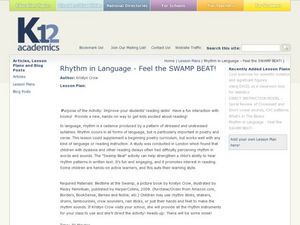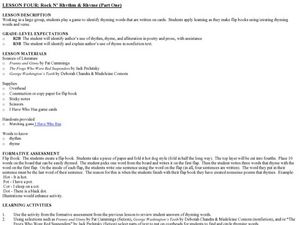Curated OER
I am Special and You are Special Too #9
Eighth graders will explore the rhythm and rhyme of poems to understand the basic elements of poetry. In this poetry and literary lesson, 8th graders relate their love for rap music to poetry. Students will discuss several different...
Curated OER
Rhythm in Language - Feel the SWAMP BEAT!
Students explore the rhythm of words. In this reading skills lesson, students read Bedtime at the Swamp and use rhythm instruments to find the cadence in the words of the story. Students listen for rhythm in other written text as they...
Teacher's Corner
Limerick
Young poets try their hand at one of the most popular fixed poetry forms, the limerick. The eighth in a series of ten poetry writing exercises.
Curated OER
Literary Terms
Seriously, 93 slides of literary terms? Yes, and well worth the time, although perhaps not all at once. The beauty here is in the concise, easy-to-understand definitions for such well-known terms as imagery and personification, as well...
Curated OER
Poetry: Developing a Taste
Students identify nouns in poems. In this poems lesson plan, students read poems, discuss them, analyze them, learn the rhythm, and ultimately define nouns that they discover in their poems.
Curated OER
Runny Babbit
Students are introduced to elements of poetry through the book Runny Babbit. In this poetry lesson plan, students learn about the newest Shel Silverstein book, then examine the poem's form, rhythm, and rhyme. Students look for other Shel...
Curated OER
Poetic Elements
Poetry is all about sound and rhythm. The sound of the words, the rhythm of the lines, and the emotional atmosphere created by these elements and the literary devices poets use, compress whole stories into a few stanzas. The specialized...
Curated OER
Kinder Poems & Songs
Students complete a year-long unit for poetry and songs. In this poetry and songs lesson, students complete nine lessons for animal songs and animal poetry to improve their understanding of rhyme, rhythm, and poetry.
Curated OER
Mother Goose on the Loose: Teaching Reading and Writing in a Way That's Exciting
Students become familiar with the conventions of print as they recognize Mother Goose poems. In this Mother Goose lesson, students follow the words from left to right as they read Mother Goose poems. Students recognize rhyming words and...
Curated OER
Poetry: Using Prosodic Devices
Students examine poetry examples in free verse focusing on their prosodic elements. After critiquing works by several authors, they write their own poems utilizing such devices as alliteration, repetition, rhyme, and stanzas.
Curated OER
Splish, Splash Poetry
Students write weather shape poems and sing weather related songs. In this creative writing instructional activity, students read the book, It's Raining, It's Pouring and list weather words they heard in the story. Students use the...
Curated OER
Poetry Power
Second graders explore language arts by analyzing poems in their class. In this word play lesson, 2nd graders define the terms rhyme, rhythm and alliteration and identify their uses. Students utilize class word lists to write their own...
Curated OER
Create a Poem
Students write three simple rhyming poems and read them aloud with rhythm. Students select two adjectives that are opposites and two rhyming verbs to create rhyming lines of the same length with an adjective-noun-verb pattern.
Curated OER
Metaphor
High schoolers identify the distinction between literal and figurative language with a focus on metaphors. They complete a metaphor analysis chart, then practice expanding metaphors by composing their own comparisons of elements of the...
Harper Collins
Every Thing On It Lessons and Activities
Honor the great poet, Shel Silverstein with eighteen activities and lessons showcasing his collection of poems from the book, Every Thing On It. Activities challenge scholars to rhyme words, make inferences, recite a poem, and more!
Poetry4kids
How to Write a Clerihew
Writing funny poems is the best part about learning poetic forms! Young poets learn all about clerihews—humorous four-line poems about people—with an explanatory lesson.
California Federation of Chaparral Poets, Inc
Poetic Devices
Have everything you need to know about the elements of poetry with a nine-page handout. Split into four categories—word sounds, meanings, arrangement, and imagery—budding poets may reference terms, read definitions, descriptions, and...
Curated OER
Introduction to Poetry
Students determine the rhyme scheme of a poem and find examples of similes. In this poetry analysis lesson, students review definitions needed for the topic and analyze the rhyme or rhythm for the example poems. Students also find...
Curated OER
Rock N Rhythm & Rhyme (Part One)
Young scholars make flip books of rhyming words and match words together that are on cards. In this rhyming lesson plan, students read books and read individual words to identify rhyming words.
Curated OER
Me, Write a Poem?
In this poems worksheet, learners write a poem where every 2 lines have to rhyme at the end. Students are given 4 prompts to get them started, but only write 1 poem.
Curated OER
Understanding Narrative Poetry
In this poetry activity, students learn about narrative poetry. They then answer 7 questions about one of the poems they read, practice writing their own narrative poem, and complete a research project using the internet. The answers are...
Curated OER
Creative Writing/Poetry Lesson Plan
Students complete poetry writing activities and art analysis activities. In this creative writing and art lesson, students analyze a cubist piece by Picasso and discuss abstraction. Students read a poem by Gertrude Stein about Picasso...
Curated OER
Rhythm & Improv: Jazz & Poetry
Students analyze the elements of poetry and jazz. In this critical thinking skills lesson, students take a closer look at the rhyme, rhythm, alliteration, form, free verse, lyricism, and imagery that exist is jazz as well as poetry.
Curated OER
What is Poetry?
Tenth graders are introduced to the poetic process. They onnect poetry to life in a meaningful way become more careful readers of poetry. They listen to a variety of poems, then write responses at the end of each adventure.

























